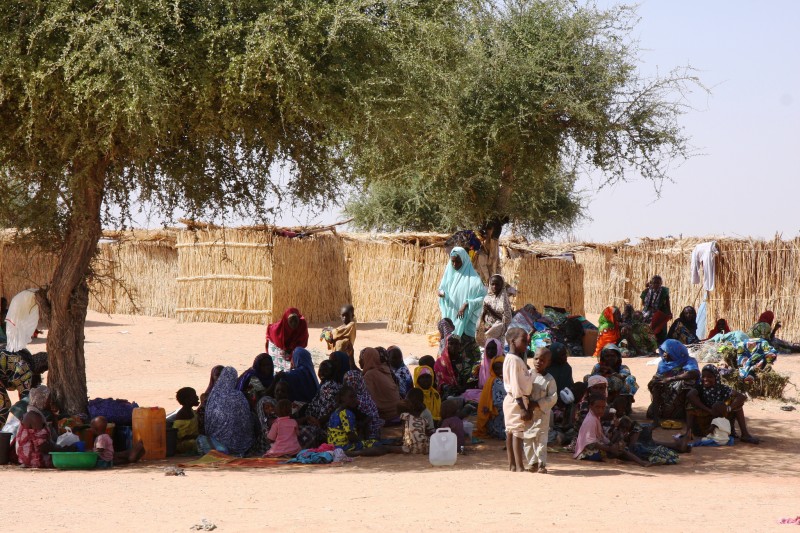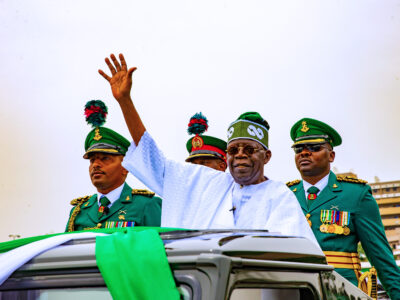
Nigerian refugees in Gagamari camp, Diffa region, Niger. They crossed the border to flee Boko Haram insurgents who attacked their town, Damassak, on 24 November 2014. Photo from Flickr user European Commission DG ECHO. CC BY-ND 2.0
Baga, a town in the north-eastern state of Borno, Nigeria, suffered an unimaginable catastrophe recently when Boko Haram, Nigeria’s vampires of death, slaughtered innocent residents of that town. Amnesty International described it as the Islamist militant group’s “deadliest massacre in recent history”. Controversy rages between the official estimates of 150 deaths against the 2,000 reported by other independent sources.
However, this horrid news did not make global headlines as much as the Paris attacks that left 17 people dead. While many reasons abound for the media silence, in this case it appears to be a combination of three factors: the nearness news factor, the numbing callousness of Nigeria’s political elites — both the ruling party and the opposition — and a compromised local press.
#IamCharlie, but #IamBaga too!
Baga is an out-of-the-way town tucked in the impermeable Borno state. Most places within north-eastern Nigeria, which borders Chad, Niger and Cameroon, are now controlled by Boko Haram. Nigeria’s chief of defense staff, Air Chief Marshal Alex Badeh, stated earlier this month that Boko Haram had seized the headquarters of a multinational military force located on Nigeria's border after Chad and Niger had withdrawn its forces from the base.
This means that neither journalists nor bloggers have full access to Baga and cannot give the exact assessment of the situation on ground. This is a direct opposite of the horror that gripped Paris, an easily accessible city full of netizens wielding smartphones. In an article for The Conversation, Global Voices co-founder Ethan Zukerman expounded further:
Paris is a highly connected global city with thousands of working journalists, while Baga is isolated, difficult and dangerous to reach. The attacks on Charlie Hebdo targeted journalists, and it’s understandable that journalists would cover the death of their comrades. The attacks in Paris were a shock and a surprise, while deaths at the hands of Boko Haram have become distressingly common in an insurgency that has claimed over ten thousand lives since 2009.
Nonetheless this does not totally extricate the complicity of Western mainstream media. Correspondent Simon Allison wrote in a piece for South African news site Daily Maverick that “African lives are still deemed less newsworthy – and, by implication, less valuable – than western lives”.
Hi Twitter, can we please talk about #Baga/North East #Nigeria now?
— Imad Mesdoua (@ImadMesdoua) January 9, 2015
Some Nigerians are of the view that the country deserves more assistance from the global community against Boko Haram's unending murders. For instance, Ignatius Kaigama, the Catholic Archbishop of Jos, Nigeria, thinks that the global solidarity accorded the Paris violence should also be shown to Nigerians. “We need that spirit to be spread around. Not just when it [an attack] happens in Europe, but when it happens in Nigeria, in Niger, in Cameroon,” he told the BBC.
‘The outrage is almost non-existent’
As much as the global media conspiracy of silence seems inviting, it neither does justice to the complex nature of the Baga massacre nor does it exonerate Nigeria's callous political leadership.
Why are we asking for the world to help us talk about what happened in Baga? Why are we not talking about it and taking action ourselves? — Henry Okelue (@4eyedmonk) January 9, 2015
Less than 24 hours after the Charlie Hebdo massacre in Paris, Nigerian President Goodluck Jonathan issued a statement condemning that “dastardly terrorist attack” but kept mute on a similar but more devastating attack at home.
President Jonathan of #Nigeria has publicly condemned the attack in Paris, but nothing about the massacre of 2000 in his own country. #Baga
— Karen Attiah (@KarenAttiah) January 9, 2015
However, about week after the Baga incident, the president visited Borno State. A statement by his spokesman states that President Jonathan told “officers and soldiers of the Division that the nation was very proud of them and grateful for their dedication and commitment to the defence of the civilian population against terrorists and violent extremists”.
President Jonathan & Gov Shettima at the Internally Displaced Persons Camp, Pompomari, Maiduguri today. pic.twitter.com/Q0hyUUtS07
— Reuben Abati (@abati1990) January 15, 2015
Nonetheless, this criticism is not reserved for the government alone, but also extends to opposition politicians who wish to score cheap political points from the Baga catastrophe.
Shout to those using Baga to score political points. We know you care. We can literally taste your empathy.
— Ikenna المتصدع فشل (@FailedRift) January 10, 2015
It's election season in Nigeria, and as such the local media is more concerned with ads from politicians, joining and covering their electoral train than any factual reporting. The Nigerian media is as much complicit in maintaining a silence on Baga as their foreign counterparts.
About 2000lives(not dogs) were lost in #Baga The outrage is almost non-existent. The local media is awash with different political rallies. — I have Shoes (@abubakar47i) January 11, 2015
The complicated mess of the Baga situation was best summed up by this Facebook post by San Francisco-based author and editor Jeremy Adams Smith:
The first thing you'll notice that there is not a lot of coverage of the massacres in Baga and Askira; in many papers, it's totally unmentioned and invisible. Why this crime is not being covered IN NIGERIA, I'll address in a moment. But what you do see in the papers is a lot of finger-pointing and rage against the government of Nigeria; of course, it's election season. It's the job of that government to protect its people, and the government is not doing its job.[…] The government of Nigeria doesn't want you to know, isn't transparent, and isn't helping people who are suffering. In fact, there is widespread denial throughout Nigeria of what is happening–a denial that extends to the press.
#IamBaga will certainly not trend as #JeSuieCharlie has for these reasons. Nonetheless, as much as there exists glaring evidence of a global media blackout on Baga, this does not mean that the Nigerian government is free from blame. At the same time, the local press cannot be canonized. In the end, it a combination of all these that make the injustice of the Baga slaughter bloodcurdling.








11 comments
Very good analysis of what is really behind the silence of the media and the situation in Baga.
It did not ‘touch me’ the way the Charlie Hedbo murders did because I am a westerner. I have never been to Africa and I don’t understand its politics. By contrast I can read french to a small degree and the events make sense to me.
business funding for small businesses
Why Hasnt the Baga Massacre Made as Many Headlines as the Charlie Hebdo Attack? · Global Voices